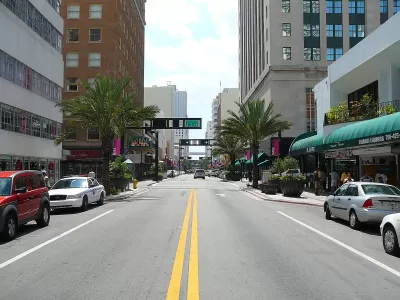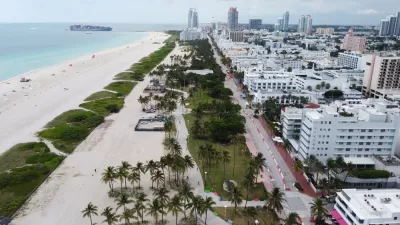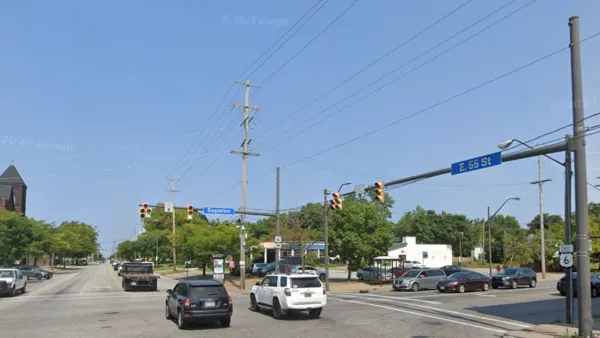The city, which has some of the nation's most dangerous streets for pedestrians and cyclists, is installing 3 miles of new bike lanes and pedestrian ramps on some of its busiest downtown corridors.

E-scooter fees will partially fund a $2 million program to add 3 miles of protected bike lanes in downtown Miami. As reported by Jason Plautz in Smart Cities Dive, "the city will install concrete barriers along the new lanes and add pedestrian ramps to adjacent sidewalks."
"The goal is to eventually build an extensive network of micromobility lanes — including bollards, concrete barriers and painted bike boxes — that would connect large parts of downtown, rather than simply adding lanes to a handful of streets, said Carlos Cruz-Casas, assistant director for mobility in the Miami-Dade County Department of Transportation and Public Works. The 'proactive' effort, he said, will help create 'a more inclusive transportation network' and also further the county’s Vision Zero goals, which seek to eliminate traffic deaths and serious injuries by 2030."
Kevin Amézaga, executive director of the mobility group Miami Riders Alliance, calls the new lanes "extremely necessary" given Miami's dangerous roads. "As scooters have become more popular and established transportation tools in cities, transportation departments around the country are rethinking their infrastructure plans to build dedicated lanes or paths that can accommodate them. Many cities — like Indianapolis, Atlanta and Santa Monica, California, — have required micromobility operators add fees or pay into infrastructure funds to pay for the new construction."
FULL STORY: E-scooter fees help fund protected bike lanes in downtown Miami

Planetizen Federal Action Tracker
A weekly monitor of how Trump’s orders and actions are impacting planners and planning in America.

Chicago’s Ghost Rails
Just beneath the surface of the modern city lie the remnants of its expansive early 20th-century streetcar system.

San Antonio and Austin are Fusing Into one Massive Megaregion
The region spanning the two central Texas cities is growing fast, posing challenges for local infrastructure and water supplies.

Since Zion's Shuttles Went Electric “The Smog is Gone”
Visitors to Zion National Park can enjoy the canyon via the nation’s first fully electric park shuttle system.

Trump Distributing DOT Safety Funds at 1/10 Rate of Biden
Funds for Safe Streets and other transportation safety and equity programs are being held up by administrative reviews and conflicts with the Trump administration’s priorities.

German Cities Subsidize Taxis for Women Amid Wave of Violence
Free or low-cost taxi rides can help women navigate cities more safely, but critics say the programs don't address the root causes of violence against women.
Urban Design for Planners 1: Software Tools
This six-course series explores essential urban design concepts using open source software and equips planners with the tools they need to participate fully in the urban design process.
Planning for Universal Design
Learn the tools for implementing Universal Design in planning regulations.
planning NEXT
Appalachian Highlands Housing Partners
Mpact (founded as Rail~Volution)
City of Camden Redevelopment Agency
City of Astoria
City of Portland
City of Laramie





























